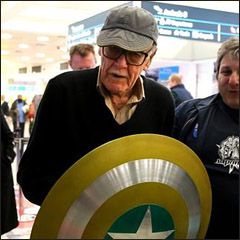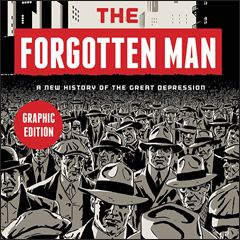Creators | Stan Lee arrived at Sydney Airport for the Supanova Pop Culture Expo and was immediately presented with a "Captain Australia" shield, colored gold and green rather than red and blue. The Supanova Pop Culture Expo kicked off today, and continues through Sunday. [The Daily Telegraph]
Comics | Hussain Al-Shiblawi says he doesn't usually mind the pamphlets he regularly receives from the local Bible Baptist Church in Roanoke, Virginia; even though he's Muslim, he finds them inspirational. But he takes strong exception to the latest one, a Jack Chick tract titled Unforgiven, which claims that all Muslims are going to hell. The pastor, who declined to go on camera, says his church doesn't create the pamphlets, it just distributes them, but he's willing to meet with Al-Shiblawi to discuss the comic. [WDBJ News]
Creators | Stephan Pastis explains how he got Calvin and Hobbes creator Bill Watterson to help out last week with his comic strip Pearls Before Swine. It all started with Pastis sending Watterson a fan letter, thanking him for his work an his influence, and Watterson replying that he had an idea for PBS. Pastis responded, "Dear Bill, I will do whatever you want, including setting my hair on fire," but fortunately it didn't come to that. [Salon]
Creators | Frank Miller revealed during a Reddit AMA that he would like to write Captain America: [The Hollywood Reporter]
Creators | Spyvibe interviews Richard Sala about his comics and how they relate to the classic 1960s spy tropes. [Spyvibe]
Creators | Brad and Leslie Brown talk about their webcomic Blaster Nation and the print edition they funded on Kickstarter. [The Daily Reveille]
Manga | The Greek collective Mangatellers is producing what is billed as the first original Greek manga, a history of the city of Thessaloniki. [Greek Reporter]
Commentary | Jeff Shesol critiques the graphic novel adaptation of Amity Shlaes's The Forgotten Man, by Chuck Dixon and Paul Rivoche, and takes up the question of the political slant of comics, which he feels are not necessarily liberal by nature. "It starts with empty panels," he writes. "You can fill them up with anything." But a strong dose of ideology doesn't make for good comics: "The most important graphic novels—books like Art Spiegelman’s Maus and Marjane Satrapi’s Persepolis — are truly literary works, rich with complexity and ambiguity, even in addressing the theme of good and evil. In the modern conservative movement you have, by contrast, a denial of complexity and an abhorrence of nuance; you have what the historian Richard Hofstadter, half a century ago in his 'Anti-Intellectualism in American Life,' called 'the one-hundred per cent mentality'—a mindset that 'tolerate[s] no ambiguities, no equivocations, no reservations, and no criticism.' This makes for pretty good propaganda, but lousy literature." And it seems to be what Dixon and Rivoche were calling for in their much-discussed Wall Street column earlier this week. [The New Yorker]
Retailing | Reporter Dustin George talks to comics retailers in the Spartanburg, South Carolina, area about how the popularity of superhero movies is helping their business. [GoUpstate.com]
Conventions | Joel Warner looks at Denver Comic Con's growing pains, including internal dissension and possible competition from Wizard World in the future. [Wired]
Conventions | New York Comic Fest is coming to Westchester County this weekend. [The Journal News]




